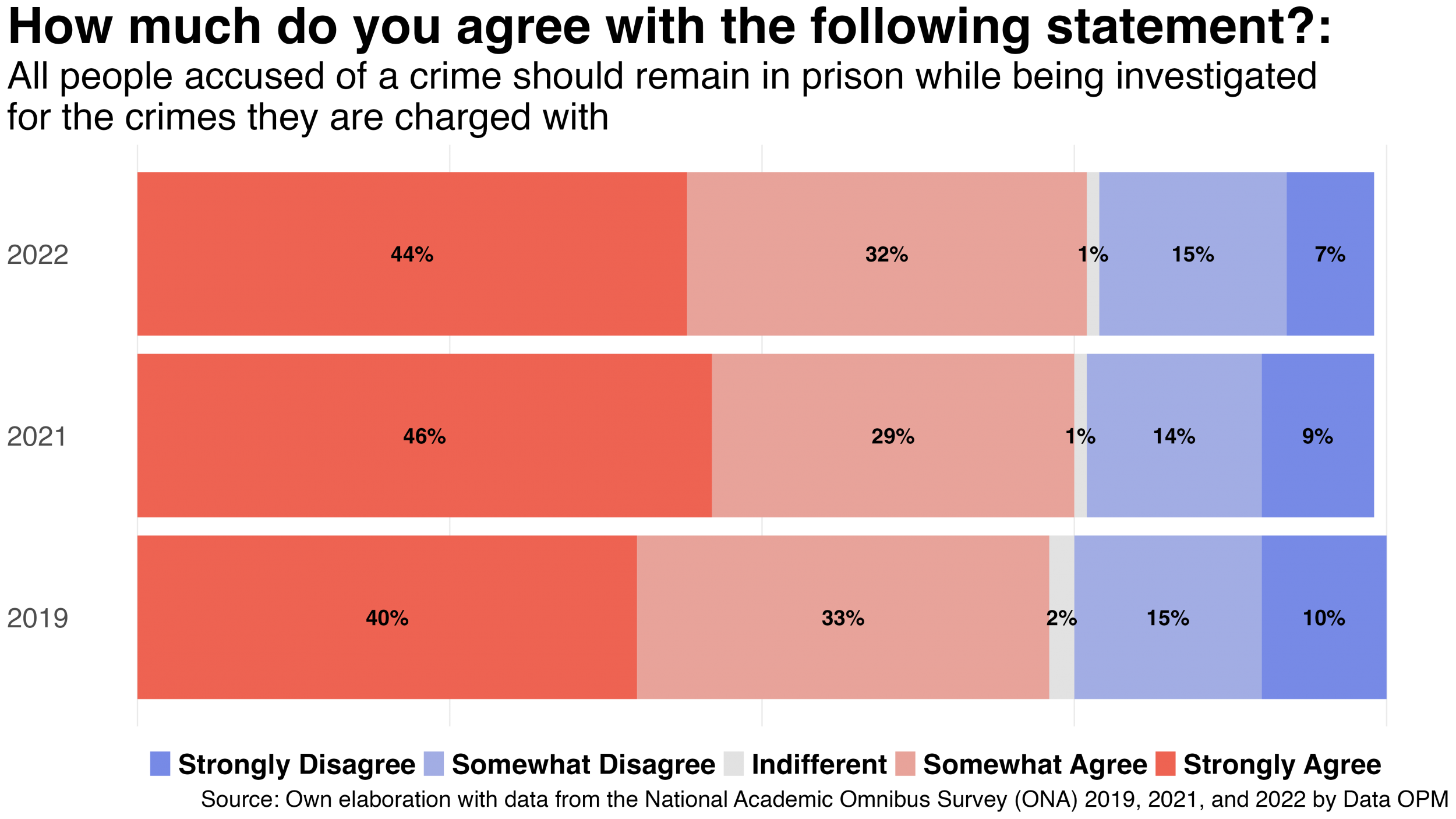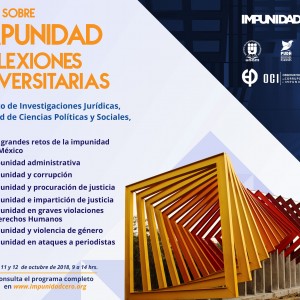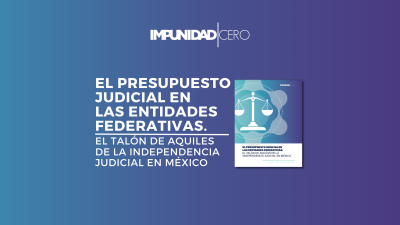The red flags of Impunity Perceptions: Mexicans want more prison and more military forces in the streets
Monserrat López Pérez | Octubre 2023
As we have documented before, impunity is widely spread in Mexico, even for high-impact crimes. The high impunity levels impact public perceptions and citizens' attitudes toward law enforcement authorities. Since 2019, to approach Mexicans' perceptions of access to justice, Impunidad Cero has formulated questions for the Ómnibus Nacional Académico (ONA) Survey, applied by the polling company Data OPM1. The results of our last research, Impunity Perceptions 2023, raise red flags about the Mexican tendency to think of punitive sanctions as a means of justice and the dangerous approval of the armed forces' participation in public security duties.
The red flags
Most of the Mexicans interviewed think that impunity is generalized and increasing: 62% consider that those responsible for a crime are never or rarely ever brought before a judge, while 47% believe that impunity has increased in the last year. The widespread feeling of impunity fosters distrust in the ability of civilian authorities to guarantee public security and access to justice, leading to punitive and militaristic perspectives on justice.
In 2022, 8 out of 10 respondents agreed that all crimes should be punished by jail. In addition, the vast majority agreed with the widespread use of pretrial detention; 76% agreed that all people accused of a crime should remain in prison while being investigated for the crimes they are charged with. The latter is particularly worrisome due to the prevalence of pretrial detention among defendants in Mexico, although it has been demonstrated that its use is not an effective measure to reduce impunity and can potentially violate human rights and due process2.
______________________________________________________________________________________________________________________________________________
1The survey was gathered between September 20 and October 8, 2022. The sample frame was based on electoral sections of the National Electoral Institute (INE). A total of 1,000 effective interviews were conducted and the margin of error was +/- 3.1 at a statistical confidence level of 95%.
2NACLA. “In Mexico, the Threats and Failures of Pre-Trial Detention.” https://nacla.org/news/2020/01/13/mexico-threats-and-failures-pre-trial-detention

These perceptions also turn on red lights due to the dangerous tendency of Latin American governments to rely on incarceration, as in the case of El Salvador. In March 2022, President Bukele declared a state of emergency, suspending constitutional rights, increasing military patrols, and making mass arrests3. But these policies, which provide a false sense of efficiency and can potentially lead to abuses and violations of human rights, are also popular in the rest of Latin America; just in the last ten years, the prison population has grown by 76% in the region4.
A major red flag identified is that, given the concerning violence and impunity crisis and lack of trust in the civil law enforcement authorities, Mexicans' faith relies on the military forces to provide public safety. Almost 8 out of 10 people interviewed are in favor of keeping the armed forces on the streets to improve security. This is particularly concerning because, in recent years, Mexico has faced a profound process of militarization of public security. In this six-year term alone, the budget allocated to the Secretariat of National Defense (SEDENA) increased, and the term for the armed forces to perform public security tasks was approved and subsequently extended until 20285.
______________________________________________________________________________________________________________________________________________
3Avelar, Bryan and Oscar Lopez. “El Salvador’s Leader Has Eroded Rights to Tackle Violence. Is It Working?” The New York Times. https://www.nytimes.com/2022/12/07/world/americas/el-salvador-state-of-emergency-crime.html
4Scartascini, Carlos. 2020. “How to Reduce Imprisonment in Latin America.” Ideas Matter (blog). Inter-American Development Bank. September 10, 2020. https://blogs.iadb.org/ideas-matter/en/how-to-reduce-imprisonment-in-latin-america/
5Stevenson, Mark. 2022. “Mexican congress approves keeping military in police work.” AP News. October 13, 2022. https://apnews.com/article/mexico-police-caribbean-legislature-reform-874696226c175ed500cdcabdbfd9d394

The general approval of the military forces for public security tasks raises the alarm because their presence in the streets increases human rights violations. Just in the past year, the National Human Rights Commission (CNDH) registered 428 complaints of alleged human rights violations by the SEDENA and 577 by the National Guard. Additionally, our country has been declared responsible on six occasions by the Inter-American Court of Human Rights (IACHR) for cases involving the participation of members of the armed forces.
The survey results reveal the citizens' punitive and militaristic vision of public security and criminal justice. But, despite being popular, these measures are far from a solution to the situation of violence and impunity facing our country. Therefore, it is essential to emphasize that these policies have not demonstrated their ability to deliver justice. On the contrary, they have provoked a major crisis in the violation of human rights with international repercussions. In this sense, we insist that the only way out of the crisis of violence and impunity facing our country is to socialize other alternatives to prison for justice (such as restorative justice) and the urgent need to strengthen civilian security and justice institutions to prevent, investigate, and punish crimes.











